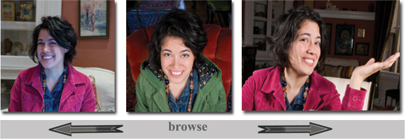Following Intuition: Caterina Fake '91
Caterina Fake ’91 does not believe in alien abductions. Statistically, this means she is unlikely to blame Nancy Pelosi for the financial crisis. She also rarely wears cufflinks, which means she’s unlikely to have been thrown out of a bar for rowdy behavior. These are just a couple of the many odd associations discovered by her latest project, a website called Hunch, which helps people make decisions (more on that later). But while her most recent work is all about decision trees, her career success is as much the result of good luck as it is the product of her choices. Along with being a self-described classic entrepreneurial personality type, she also has a knack for being in the right place at the right time.
As early as Vassar, where she majored in English, Fake was lucky enough to be able to “get her geek on” long before many of her peers, thanks to Vassar’s VAXSAR system, a campus-wide network that connected to an intranet, which students could access from the comfort of their dorm rooms. Few students took advantage of the system in 1989, when Fake transferred from Smith College to Vassar. “If not for VAXSAR,” she says, “I don’t think I would be doing what I’m doing today.”
Vassar not only provided her with an introduction to computers; it also “allowed for a kind of self-invention that you don’t see at other schools,” she notes. “Vassar always seemed to encourage individual pursuit. It was very much suited to an entrepreneurial bent.”
After Vassar, Fake went through the “post-college what-do-I-want-to-do period,” working as everything from a painter’s assistant to an investment banker to a salesperson in a dive shop. In 1994 she was on her way to a climbing expedition in Nepal when she stopped off to visit her sister in San Francisco. The trip got delayed, eventually for good, so Fake stayed until her sister suggested that she get a job and a place of her own.
“I didn’t really know what I was suitable for, given my background,” says Fake. But it wasn’t hard to figure out the most interesting thing to do in San Francisco at that time, so she decided to teach herself about the Internet. “I had enough geeking experience that I could figure out the basics,”she says. She created a few websites and began designing CD-ROMs. Accidentally landing in San Francisco at the height of the dot-com boom was serendipitous, she says, “although I guess it shows a certain amount of pluck and ingenuity.”

Before long, Fake was one of the most experienced web designers around. She freelanced and worked at start-ups. Like any budding entrepreneur, she “hated the day job” and didn’t really work well in a big company with a lot of bureaucracy. “I was always fairly self-employed,”she recalls.
In 2002, having experimented with blogging, personal publishing, and other avenues of online community, Fake and a partner started a company called Ludicorp with the intention of creating an online role-playing game. It was a difficult time to raise money, thanks to the ensuing dot-com crash, but Fake saw the lack of opportunity as a great impetus for creativity. They got friends and family to invest and, at times, sold their furniture to make payroll. “Entrepreneurialism is not for the wimpy,” says Fake. “It was a fairly dark time.” But after several stops and starts, launches and failures, “from the ashes of our poor game,” grew the website Flickr.
Flickr is “almost certainly the best online photo management and sharing application in the world,” according to its “about us” section. It allows users to share and organize photos in a variety of unusual ways. Visitors to the site can “explore the gorgeousity” by looking at images posted on a certain date, or tagged with a certain keyword, or taken at a certain location.
The site was born at the right time. It emerged at the convergence of several different Internet trends: the increased use of broadband Internet access, the widespread use of camera phones and digital photography, and the emergence of social software. While photo sharing sites were nothing new at the time, Flickr was different in one key way. “Our biggest surprise was what happened when we changed the default photo from a private photo to a public photo,” Fake recalls. “We went from having less than 10 percent of photos public to having more than 80 percent public. By sharing images via tags, users are able to see stuff that’s going on all over the world.” Photos of major news events go up minutes after they’re taken, making the site what Fake refers to as an infinite National Geographic.

“It just grew like wildfire,” she says. “We had definitely been trying to create something collaborative and universal and great, but we had no idea it would be as successful as it was.” The fact that the public photo feature was such a hit signified the changing ways in which people view and use the Internet. “At the beginning we’d get a lot of people asking, ‘Why would anybody make their photo public?’ says Fake, but notes that in the age of Facebook, “people aren’t as afraid of it as they used to be.”
In 2005, less than a year after its launch, Fake was in acquisition talks; the site was eventually bought by Yahoo, which meant Fake had a day job for a few years as the leader of their technology development group.
“The job was to Yahooize Flickr, but I thought it would be much more fun to Flickerize Yahoo, so I built some innovative new products. I decided that while I was there I would learn the most interesting thing I could learn there and nowhere else.” As a result, she worked on MyWeb, a social bookmarking service, and Yahoo Question & Answer.
Flickr brought Fake great acclaim. Among other honors, she was named one of Business Week’s Best Leaders of 2005, appeared on the cover of Newsweek, and in 2006 was named one of Time magazine’s 100 most influential people in the world. She began advising start-ups and new businesses, and in 2006 became one of the first investors in Etsy, an online marketplace for handmade items.
In 2008, while looking to join the board of another company, Fake met with a group of MIT Ph.D.s who were working on creating decision trees for the web. She says, “They were very much on the hardcore, back-end, algorithm, brute-force computation tech side of things. My background is in the people-oriented design, social-software side of things. So it was kind of like chocolate and peanut butter, the meeting of people who were destined to meet each other.” Not only did Fake join their board, but since she is “unable to let opportunities pass, unable to sit quietly in the corner,” she ended up rolling up her sleeves and getting involved. Before long she became a cofounder of what today is Hunch.com.
Hunch, which Fake refers to as “the world’s fanciest, most elaborate, most highly engineered MIT-Ph.D.-built ‘Magic 8 Ball’ in the universe,” works by gathering information about users, who teach Hunch about themselves by answering questions about everything from their preferred type of French fries (bistro or McDonald’s?) to how they eat their pizza (by hand, or with a knife and fork?). Do you wear high heeled shoes? When was the last time you washed your hair? The more questions you answer, the more Hunch knows about you.
Once Hunch knows you sufficiently well, it can help you make decisions. “Say you want to buy a plasma TV,” says Fake. “If you’re anything like me, I really dread going online, reading all the reviews, doing the comparison shopping, figuring out what I want. I want to say, ‘I want a 56" screen, I want to pay $1,200, I want something that’s highly recommended and black or stainless, and hangs on my wall.’ And then I want somebody to say, ‘Buy this one.’ That’s what Hunch does. It asks you all these questions and then it’ll tell you which model to buy.”

Not only does it get to know each user’s tastes, but the more it knows about every individual, the more it can create interesting correlations about people. Such as: People who have used a fake ID to do something they weren’t supposed to do are more likely to be happy at start-ups. And people who like to dance are more likely to want to switch from a PC to a Mac. Once Hunch has this data, Fake explains on her blog, “we can improve the Secret Sauce so that all of Hunch’s results are tailored not only to you, but people like you. We can tell you how much of an outlier you are, or how non-unique.”
A lot of work goes into bringing users what Fake refers to as “that magic Internet feeling.” There are complicated MIT-engineered algorithms going on behind the scenes; the challenge, says Fake, is to create a complex product that’s intuitive and easy to use. “Part of the equation is user experience — how does it feel? How do we integrate all this stuff without making it too burdensome on the user? How do we encourage the right people to contribute?
She likens it to Wikipedia. “In its early stages,” says Fake, “you could see the potential in it. Hunch right now is a product with a lot of potential, but it needs a lot of user input to get really good. And I think the web has evolved in such a way that new products are always possible.”
It’s this sense of endless possibility that keeps Fake energized about her work. “We’re inventing something new,” she says, “so there’s a sense of adventure, of being a pioneer. There’s nobody telling us what to do. You sink or swim based on what you do every day. This is exhilarating or terrifying, depending on the day. But it’s mostly exhilarating.”
Even after a product is launched, Fake enjoys the surprise of discovering that users find unexpected ways to employ her creations. “When we started Flickr,” she writes on her blog, “it was hard to classify — was it a social network? A platform? A hosting service? Blog software? It turned out to be a lot of things that we’re still trying to get our heads around.”
Of course, Fake herself makes good use of her own inventions. “We eat our own dog food around here,” she says of Hunch. She has used the site to guide numerous decisions, both important and trivial. She’s asked Hunch: “Which rock group would I like?” “Which swimsuit is right for my body?” “Which Woody Allen movie should I see?” She’s even tried out the question “Which Internet entrepreneur am I?” The answer? Caterina Fake, of course.
— Bronwen Pardes ’95 is the author of Doing It Right: Making Smart, Safe, and Satisfying Choices About Sex.
Photo Credits: Alain McLaughlin
Have comments about this article? Email vq@vassar.edu
